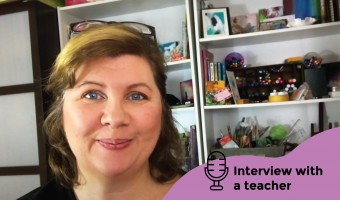Particularly with the circumstances that the COVID-19 pandemic has forced upon us, there are countless activities that you can engage in to stimulate your brain, learn something new every day and develop yourself as a lifelong learner.
Learning can have countless benefits for your body and your mind. It can improve your memory and brain function, increase your confidence, reduce stress levels, improve your mental health, accelerate your career, allow you to meet new people and give you a sense of purpose.
Many of us believe that we do not have enough time to learn something new. This is not the case. We can all find ways to learn new things during activities that we carry out every day.
Whilst it may also feel like there are not enough hours in the day, learning does not have to take several hours out of your day. Bite-sized learning and learning things in as little as 5 minutes is a new trend that is only predicted to increase. Why not hop onto the trend now?
If you are not sure about how to learn something new every day, here’s a list of suggestions for you to check out.
#1 Try an Online Class
The most popular method of learning nowadays is by using new technologies and the internet. Why not take advantage of advancing technology and the free time that you may have during lockdown?
There are countless lessons available online for all sorts of activities, possibly more than you can imagine. You could try sewing, ceramics, herbology, water-coloring, baking and even tarot card reading. If you want to advance your knowledge in other areas you can try astrophysics, neuroscience, medicinal chemistry or mathematics. The possibilities are endless. Furthermore, online classes do not tend to require prerequisite courses or knowledge. They usually are made for complete beginners and can be as short as 15 minutes in duration.
You can also try out the live tutoring calls feature on the learning platform InfoDepot, which connects you to a teacher in real time for a lesson over the phone or by video. This means you can ask them questions directly about particular areas of the topic that interest you.
Why not dedicate just 15 minutes of your time to online classes and learn something new every day.
#2 Socialize
Learn to network and constantly meet new people. Ask them questions, investigate and discover. If you meet an accountant, ask them to tell you a little about their profession. If you meet a gymnast, ask them about their training plan at the gym. If you meet a historian, ask them about a particular historical event that you have some interest in.
You can always learn from other people and your conversations with them can spark an interest that you may never experience otherwise. Once this curiosity has been sparked, you can pursue the topic that interests you and discover more about it.
Your friends and family are also likely to have some knowledge about topics that interest you, so you can socialize with them too! Questions and conversations are all it takes.

#3 Read Articles and Informational Pages
Visit websites that provide educational articles frequently and read the featured articles. If you have a question about something, search Google for articles written about it.
Read widely, ratify sources and come to your own conclusions. This is a highly useful skill to possess, particularly for your career.
Websites you can try include the National Center for Biotechnology Information, Scientific American, The Economist, The Financial Times, Big Think and The Chronicle of Higher Education.
#4 Visit Museums
Visit areas that bombard you with information. That can be museums, zoos, aquariums or art displays. Rather than just passively looking at the artifacts or the animals, read the information that comes with it.
Learn fun facts about the fish, learn about the painter, learn about the historical period in which the artifacts were found. If you come across something interesting, research the topic in more depth.
These places are designed to facilitate learning. Take advantage of them.
#5 Expand your Vocabulary
Keep a dictionary handy (it can be an online dictionary!). When you hear a new word, look it up, write it down and memorize it. Actively try to use it and incorporate it into your conversations.
If you want to try and learn a new word every day, a book by Joseph Piercy ‘A Word A Day’ provides you with a new word each day for a year. For a free option, check out the word of the day at Merriam Webster or Dictionary.com.
Learn to love language.

#6 Listen to a Podcast
Podcasts are a great way to practice learning on-the-go. You can browse different apps and websites to find your favorites. Podcasts allow you to discover a bit more about world events and societal issues or you can begin learning some new subjects that interest you. If you are not an avid reader, podcasts can work for you.
Try listening to podcasts whilst commuting, traveling, going to the gym or before bed to fit in your daily dose of learning.
#7 Listen to TED Talks
TED talks are short videos discussing a particular topic, issue or subject. You can filter the videos by length if you only have 5 minutes to spare, search particular topics or speakers that inspire you. TED talks cover anything from personal relationships to career advice, so you can find the perfect speaker and topic for you.
You can also browse and explore some new interesting videos to watch on the home page which will help you learn something new every day.
#8 Play Games
Games to keep the brain engaged have been around for a long time. Remember Nintendo Brain Training by Dr Kawashima?
Cognitive games and brain training can be found anywhere.You can search through the applications on your phone and try games that will challenge yourself. If you would like to try out learning online, you can try sites such as Lumosity. These types of games don’t feel like conventional learning and can help to prevent memory loss and dementia.
Sudoku is also a well-known way to boost your brain power. It improves your memory abilities, keeps your mind active and stimulated, increases your ability to concentrate and prevents the likelihood of developing Alzheimer’s in later life.
Learning can be fun!
#9 Learn a Language
Learning a new language can allow you to connect with a larger number of people, explore new cultures and can help to advance your career. It can also have numerous benefits for the brain, such as enhance your ability to multitask, sharpen your mind, improve your memory and increase your attention span.
Remember the last time you went on holiday and you struggled to understand the hotel staff? What if you could understand and respond perfectly the next time you visit?
If you are not sure where to begin, start small and watch a foreign film with subtitles. Then you can check out some online courses to start your learning journey!
#10 Watch Films and TV Shows
There are several TV shows that you can watch in order to learn more about topics that you are passionate about. For instance, if you are interested in life in the sea why not watch Blue Planet? If you are interested in the environment and sustainability, try Zac Efron’s show Down to Earth? If you are a fitness fanatic, why not watch The Game Changers?
Find what it is that interests you and search the television or streaming sites such as Netflix, NowTV, Amazon Prime for appropriate films and shows.
The best part? It doesn’t even feel like learning.

#11 Browse on Social Media
Social media is the way forward. There are millions of accounts containing inspirational quotes, fun facts, advice, tutorials and discussions to help you learn.
Whether you are interested in finances or perhaps in personal development, there is the right account for you that will inspire you on a daily basis.
Find your interest and incorporate it into your online life on social media, a place that you visit several times daily.
#12 Do some Gardening
Gardening allows you to learn about different flowers and the conditions in which they grow best. You must read, search for information and learn about particular minerals and their functions to successfully grow plants and care for them in the best way possible.
You can also grow your own fruits and vegetables and educate yourself about the benefits of organic food, healthy eating, vitamins and sustainability.
Gardening also reduces stress, strengthens the heart and increases levels of serotonin.
#13 Cook or Bake
You may be thinking, how is baking a victoria sponge going to help me learn something new every day?
Well, you can learn about which flavor combinations best compliment each other, the way that different techniques of chopping, mixing and heating affect the final product, the nutritional values of the food you are making and even the way that particular ingredients are sourced.
Cooking and baking can teach you a variety of things, not just the temperature at which muffins should be baked.
#14 Exercise
You can learn about the types of exercises that best aid fat loss or muscle gain, the machines which are most likely to cause injury and the names of particular muscles. By going to the gym and observing the activities of others and talking with personal trainers, you can find out what the best and most effective method of exercise is for you and why.
Exercise also improves blood flow, improves memory abilities and stimulates learning due to chemical changes in the brain.
Who would have thought that lifting weights can help you learn something new every day?

#15 Learn about First Aid
You could take a First Aid course to learn how to perform cardiopulmonary resuscitation (CPR) and respond to situations such as bleeding, burns, poisoning and respiratory problems. Learning such techniques allows you to help people with what you learn and save lives.
If you are interested in lifeguarding, you can also complete a lifeguarding training course. These qualifications are useful to have and can help you gain a variety of widely sought skills, such as the ability to respond during an emergency.
#16 Learn how to Drive
Take lessons with a driving instructor and work towards your test. By learning to drive, you are learning about road signs and their meanings, the physical operation of the car, perceptive abilities, planning and anticipation and vehicle safety.
Learning to drive is much more than the clutch, brake and accelerator.
#17 Take Care of the Environment
Learn about which human practices are most harmful to the environment and eradicate them from your lifestyle. Learn how to properly recycle, be sustainable and care for the planet we live on. Find out the exact reasons for which our environment is deteriorating. Learn about the Earth.
Become an activist.
#18 Practice Self-care
Learn how to take care of your skin and your body. You could make your own soap, body scrub, salts creams, lotions, butters and oils. Discover which ingredients create the best products and why. Continue practicing and make the best product you can, maybe you could even sell your items to others and learn about the marketplace and business tactics!
You can also learn about mental health and how to relax your mind. There are several self-help books you can delve into and life coaches that you can follow on Instagram to do this. Discover more about feelings of anxiety, how to cope with stress, managing your emotions and your social life. Learn about yourself.

You do not have to incorporate all of these into your lifestyle immediately to learn something new every day.
Start small and try the ones that interest you the most first.
Once you feel comfortable with expanding your knowledge further and trying new techniques to do so, try a few more and so on. Do not overwhelm yourself.
Learning is so much more than what conventionally comes to your mind when you hear the word.
Learning does not just mean teachers, textbooks and 1 hour lessons. Learning is multidimensional and can be centered around any subject in the world, not just maths or physics.
As Bradley Trevor Greive states in his book, The Meaning of Life, ‘Find out what you love to do and do it’.
Ready to start learning new things every day on InfoDepot? Join now.





Comments